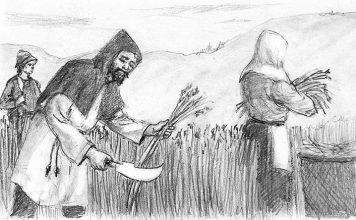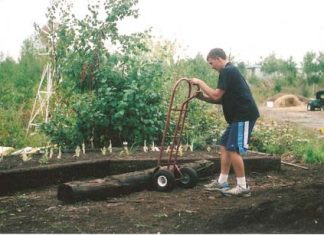 |
|
| Issue #138 • November/December, 2012 |
Bartering may not be a part of your life, right now, but if there’s a deepening of the recession, or it becomes a depression, or we enter a period of runaway inflation (See A quick tour of hyperinflation and the possible consequences for America, March/April 2010) you may find yourself out of a job or you may have a job but get paid near-worthless money. Bartering may be the best, perhaps the only, way to get the goods and services you need.
You’ve bartered since you were a kid, starting perhaps when you swapped a comic book for a yo-yo. Today, you can find people willing to barter online. You can go to the opening page of craigslist.org, look under “for sale,” and between “antiques” and “bikes” you’ll find “barter.” Many of the items listed there are actually for sale (are people who do that stupid or just crafty?), but you’ll still find plenty of people willing to make trades. Keep in mind that when you see something for sale, whether it’s on Craigslist or elsewhere, the seller may also be willing to barter and this is going to be more likely as the economy tumbles. It never hurts to ask as long as you’re not rude, arrogant, or condescending.
So, what can be bartered? Pretty much anything. I can give you some ideas, even some that are unconventional. But there’s no way I can cover every conceivable thing you can barter. However, let me separate barter into two categories: goods and services. You can even mix them: “I’ll mow your lawn for two dozen eggs.” You get the gist.
So let’s take the goods, first, and allow me to make some suggestions.

Laying in some junk silver is a good idea if you’re anticipating a barter economy. Though the coins will have a “face value,” you’re not going to be spending them as money, but trading them because of their precious metal content.
Food. Garden produce, fruit from fruit trees, chickens and eggs, milk, etc., can all be bartered. The more rural you are, the easier it is to raise your own food, not only for your own consumption but for barter, also. On the other hand, the further out you are, the harder it is to find customers with whom to trade. Still, if you have the space and inclination to garden, in hard times you will want to grow more food than you would in good times. If you’re out of work, you never know when you may be able to trade tomatoes and zucchinis for essential goods and services. Extra garden produce will also feed you and make it less likely you’ll have to barter away your own goods and services in a desperate attempt to feed yourself or your family.
I’m not going to give advice on how to raise food, but I will, at the risk of sounding like a shameless shill for this magazine, say that if you’re already a regular reader, you can readily find hundreds of articles on gardening and livestock in back issues and anthologies.
As an aside, if you live in an area where you can find a variety of ethnic neighborhoods, it would be worth reading Selling chickens to an ethnic market, by Dynal Geissal, which appears in BHM’s Third Year Anthology. Very often immigrants come from countries where barter is more commonplace and you may be able to carve out a niche market.
Cash transactions
Selling something for cash is actually a form of barter; we’re simply trading an item or a service for money instead of for another item or service. However, when talking about barter, the convention is to talk about a transaction not involving cash.
Seeds. Along with garden produce, seeds can be a barterable commodity, especially in the first year of an economic crunch when many people are not going to be prepared. If you have a garden, tend toward planting open-pollinated varieties of vegetables and learn to save their seeds. You’ll not only save yourself money, but you can also create your own store of seeds for barter.
Open-pollinated seeds produce true from one generation to another, and we’ve had three very good articles on why you should use them, all written by Jackie Clay: Use non-hybrid seeds and save big bucks in this year’s garden, which appears in the Ninth Year Anthology; Grow open-pollinated seeds for self-reliant gardening, which appears in the Tenth Year Anthology; and Saving Seeds, which was the cover article in the May/June 2011 issue of BHM.
Before I get into other items possible for barter, there’s a question: Should you stockpile things to barter? The answer is, “If you’re so inclined to, yes.” But what to store? Storing seeds makes perfect sense if you’re already a gardener, and storing more than you need is prudent.
However, many barterable items are things you’d buy now, and buying things now means spending cash and finding storage space for it all, now. I’m inclined to have junk silver, guns, ammo, garden seeds, some fishing stuff, playing cards (actually, all sorts of games may bring a premium depending on how bad a crunch we get into and how reliable the electric grid is), and even meat grinders, so I collect all of these things. Yours may be canning jars and garden tools. Look around you. All the things you like and find useful are likely to be things other people will like and find useful when jobs are scarce.
However, when I stockpile food, I generally don’t consider it barterable. I store it for my own consumption, and food bought now is sort of a hedge against inflation.
But having the means to produce food, such as a garden or egg-laying hens, is a way of generating both food for yourself plus trade items for a barter economy.

This is Dave Duffy’s coffee-making setup. To the right of the box of raw beans is a home-style electric coffee roaster and beside that is his French press for brewing coffee. In front of the box of beans is an old-time, hand-cranked, wooden coffee grinder. Why the fry pan? You don’t need the electric coffee roaster a skillet will do the job, too.
Silver and gold. Laying in some silver especially “junk silver” or gold is a good survival strategy. If the economy crashes, not only is it possible you’ll be out of work but cash may also become essentially worthless. Junk silver or gold will have what many will see as intrinsic value. But don’t stock collectible or numismatic coins with the idea they’ll have great value during an economic downturn. It’s possible they will, but not likely.
Two very good articles on silver and gold were written by Thomas Buckley for our November/December 2010 issue. They were titled A guide to buying silver and gold and Finding wealth you can wear at yard sales. Following his advice is not only a profitable idea you can turn into fun today (hitting the yard sales), but it may provide you with barterable items for bad times tomorrow.
I also wrote an article titled Stashing junk silver for bad times which you can find in the September/October 2011 issue of BHM. I go deeper into why I like junk silver coins and I make some recommendations of which coins I think are best and how much to buy, among other things.
I buy old meat grinders, the kind my mother used to have that she clamped onto a table’s edge and used muscle to power. I find them at yard sales, flea markets, and thrift stores. I bring them home and clean them up. In a barter economy, they’re going to be worth something to someone who wants to grind wild game or fish to make patties. Jackie Clay has used them with a coarse blade to grind grains. A meat grinder is not only a decent barter item, it also widens the scope of items I can barter for (for example, whole grains).
Ammo. If you have a prepper/survivalist mentality, you may already have laid in guns and ammo. But keep in mind that in a severe economic crunch, weapons and ammo may not only provide self-protection and hunting, they also make great barter items. Neither seem to ever depreciate, in fact they seem to keep up with inflation or do better.
If you do consider ammo for barter, common calibers, such as .22, .30-06, .223 (5.56 mm), and .308 (7.62 mm) are best. For shotguns, 12-gauge and possibly 20-gauge are best. The same goes for handgun ammunition, that is, common calibers like .38, .357, .40, 45, and 9 mm. The ability to reload ammo may also become an asset in bad times.
In publications such as Shotgun News you can find vendors that sell military surplus ammo at reasonable prices. But make sure you stay current with whatever laws apply as more and more government entities are restricting ammo and there may come a time when the amount of ammo you have or what you can do with it are restricted.
Garden tools. If things go south, you may find yourself surrounded by a lot of wannabe gardeners and having secondhand gardening tools, picked up today at yard sales and stored in a corner of your garage, shed, or cellar, will be good bartering items.
Tobacco. People smoke. I used to smoke cigarettes, occasionally a pipe and cigars. I don’t now. During an economic crunch, most people aren’t going to simply decide, “Good time to quit!” It’s an addiction and they’re going to feed it. It’s not my place or yours to judge what someone else does with his or her own body. Some of your neighbors are going to grow and cure tobacco to fill the demand and you may wish to take advantage of it.
If you need some direction, both the Seventh and Tenth Year Anthologies have articles by Rev. J.D. Hooker about cultivating and curing tobacco. But tobacco isn’t only for smoking and chewing, it’s also a dewormer for farm animals and can be used to create a natural insecticide, so its barter potential is enhanced.
Booze. It’s not just alcoholics who like to drink. Plenty of people like social drinking and just the good feeling a slight buzz can bring at the end of a long day. Legalities aside, here’s what some of your friends and neighbors are going to be doing: brewing beer, making wine, distilling spirits and using them to barter. (Wine may be easiest to make since you can make it out of so many things.) Like other “vices,” alcohol is not going to go away.

That’s Dave Duffy, the publisher of BHM, cutting my hair. He was doing it for free, but haircutting and cosmetology are barterable skills.
There’s an online index to articles on BHM’s website where a quick search for “beer” and “wine” will turn up quite a few articles on those subjects, but here are a few of the articles BHM has run in the past, along with the anthologies in which they appear:
Home brew your own beer, Part I, and Part II, by Richard Blunt in the Sixth Year Anthology and Uncommon wines another way to save the harvest, by Anita Evangelista, in the Third Year Anthology.
If using alcohol for barter sounds attractive to you and you already drink wine or beer, now is the time to try making some. You’ll find it fun and interesting and, if a barter economy comes about, you’re going to be very popular.
Barter and the IRS
In 1974 or ’75, I read an interview with the (then) new chief of the IRS, in U.S. News and World Report. He wanted to revamp the IRS’s collection methods.
He wanted to include more things as income. For instance, if you had a garden, he regarded the produce from that garden as “income” and he wanted a method by which to assess its value and charge you taxes on it. In essence, what he wanted was: Grow some tomatoes, figure out what their market value is, and include that as income on your tax return.
I don’t think his proposal went anywhere, though I wouldn’t be surprised if it was enacted and is buried in the IRS regulations somewhere. So don’t be surprised if in bad times, the issue doesn’t rear its ugly head again. Bureaucrats don’t produce anything; they derive their incomes from what they can take from the public at large. They want to survive just as badly as you do. So if they can ever figure out a way to make you pay them for allowing you to grow your tomatoes and zucchini, they are gonna do it.
One caveat: According to IRS rules, bartering is taxable. If I grow tomatoes and you have laying hens and I trade you some of mine for some of yours, the IRS has a place in their rules that says we have to pay them money when we make the swap. Just saying. You’re going to have to consider how to handle tax issues yourself. (You can go here for the details.)
Medical marijuana. I’m not going to tell you to grow pot for recreational use because of the various laws, and we’ve never run an article on cultivating it. But some of your neighbors are going to grow it if it means supplementing their incomes to feed their families or pay the rent. In 14 states it’s legal to grow for medical usage. At this moment, Oregon, where I live, is one of those states.
Again, if you’re going to try bartering ammo, tobacco, alcohol, or pot, find out what the local, state, and federal laws are before you start.
Coffee. It’s one more thing people are not going to want to give up in bad times. It happens to be my drug of choice. We just bought an article (to run in a future issue) from a guy who roasts coffee beans for personal use and resale. I don’t know how he calculated it, but he figures to make $300 to $500 a year doing this in his kitchen. Not much, but combined with other incomes, it helps. However, coffee is currently going for $9 to $12 a pound and, according to Dave Duffy, the publisher of BHM, who roasts his own coffee, he’s buying the raw beans for $3 to $4 a pound, which leaves some room for profit, were he to sell them. More aggressive selling or bartering would significantly improve your return.
Besides selling/bartering coffee with family, friends, and neighbors, there will be restaurants that will trade for or buy freshly-roasted coffee beans and ground coffee, as will some grocers and other stores.
Incidentally, if you’re a real coffee fancier, and you are thinking about stocking up on coffee beans, though roasted coffee beans have a short shelf life, raw beans, properly stored, can last for years. So, if you’re already a coffee connoisseur, laying in a lot of beans for potential barter is a possibility.
Water. I was going to say to stock up on water, and you should have some on hand for short-term emergencies anyway. An article worth reading is Vicki Tate’s short article, Storing water for an emergency, in the Tenth Year Anthology. But even better is to stock up on a way to purify water. Clean water is likely to be available during a recession or depression. But if economic collapse is too deep, it’s possible that potable water may be in short supply or difficult to obtain, at least for a while. I got a Berkey Water Filter for this reason. I can run swamp water through it and have something fit to drink. Having said that, it wasn’t lost on me that potable water may become a barterable commodity.
Solar. In uncertain times, anything solar that you have may well be an asset. And here’s a thought: Have the ability to charge rechargeable batteries, including laptop computer batteries, with a solar charger. People will appreciate such a service if things get so bad the grid goes down, even if it’s just a temporary outage. It would be nice to barter something produced with sunlight electricity for a bunch of veggies grown with sunlight.
I’m going to get a solar battery charger and among the vendors I’m going to check out first are Humless and Solutions From Science.
The list of barterable goods is endless. Don’t count anything out. There are probably plenty of “useless” things around your house that you could barter for things you really want. Old clothes and toys your children outgrew, old furniture sitting in your garage that was left to you by your beloved Aunt Agatha, even books you’ve read that you could swap for other books, tools, food, etc.
That’s just a handful of suggestions for barterable items if you lose your job or society otherwise goes boom and takes the economy with it. But it’s also possible to barter services or to create unusual service jobs for yourself. If you want ideas, it’s worth looking at what people did in the past, such as during the Great Depression.
Services

A way to produce potable water not only has survival value, but potable water may be a commodity in a crashed economy. This is a water filter made by Berkey.
First, assess yourself and assess your area for what skills are likely to be needed.
My Dad gave haircuts during the Great Depression. He had a list of regular clientele and he got a little cash and sometimes got some goods from each of them for his services. It added up. He wasn’t a barber by trade, he was just good at giving haircuts, so he had customers.
He also repaired watches. This was in the day before disposable watches. He had a small repair kit that fit in his pocket. It consisted of a loupe, some small screwdrivers, assorted screws, tweezers, and a small bottle of whale oil which he said was the finest lubricant around. I have part of that kit now, though I haven’t a clue as to how to service a watch. As with the haircuts, he supplemented his income repairing watches for family, friends, and coworkers.
This one comes from left field, but some 35 years ago I read a book on seven card stud. The author said he made his living during the Great Depression playing that game at $0.25-$0.50 limit. That may not seem like enough to support a family, but there are two things to keep in mind. One is that the average hourly wage during the Great Depression was about $0.65 an hour. The other is that, dollar for dollar, the silver currency of that day had a lot more value than today’s fiat money (i.e., money not redeemable for something tangible such as silver or gold). In fact, today a 90%-silver quarter is worth somewhere north of $5 in purchasing power and a silver half dollar more than $10. A quarter during the Great Depression had about the same purchasing power as $5 in today’s funny money. Unlike my father’s haircut and watch repair that brought a little money into the house, this guy apparently supported his family solely by playing poker (which, unlike most gambling games, is a game of skill).
Today, the game you’re likely to find players for is hold’em. But don’t kid yourself about your gambling skills. The best poker players are like the best chess players: They study the game. By the way, it’s not a stretch to imagine playing poker for junk silver coins as a means of supplementing your income. They’d make the ultimate poker chips.
Something else that’s going to happen with poker games is that some people are going to run poker games out of their homes, in which they cut the pot, just like the casinos do. That is, they take a percentage of each pot when the hand is over. It’s illegal almost everywhere (unless you’re a registered casino) but I played in quite a few such games, hosted by others in their homes when I lived in Southern California. It’s just one more “vice” that’s not going to go away. On the other hand, playing well in a home-run game is not illegal. That is, if you play well enough and your opponents are bad enough, you don’t have to cut the pot.
Buy broken and repair it
I met a man who buys “broken” and worn-out fishing reels at swap meets, flea markets, and yard sales. He said they’re real cheap when they’re broken. Sometimes, they’re free. But he likes to tinker with them and he can fix most of them. Once repaired, he sells them.
The ability to find and then repair frequently-used items that for one reason or another no longer work, can be a boost to your income in a barter economy.
Talking about fishing, Tom Mysiewicz wrote an article on making fishing lures he sells: Holy mackerel, don’t flounder around; make your own lures just for the halibut, which appears in the Ninth Year Anthology.
And don’t forget, well-made lures might not just bring cash, local stores may be willing to trade with you for them (or anything else you make that they can put on their shelves and sell). In the early days of this magazine, the publisher, Dave Duffy, bartered issues to a store owner in Casitas Springs, California, in exchange for six-packs of beer. So, the system works.
Having tools can make you invaluable, whether the tools are used for barter or, better yet, to provide a service. Carpentry tools, electrician’s tools, and of course automobile repair tools can allow you to barter those items. Better yet, if you’re good with those tools, you can barter your time.

A garden can produce food to be used as barter as well as producing food for your family, making food one less item you’d have to barter for.
Gardening. Hand in hand with garden produce, garden tools, and the seeds mentioned above is the fact that there are plenty of people who don’t know how to garden. It may seem easy to the experienced gardener, but to those who have never done it, it seems like you just throw seeds in the ground. Teaching how to garden is a barterable skill.
Tutoring. You may have skills parents would like to barter for to help their children. A background in subjects such as math and science or a foreign language can be especially valuable. Even in bad times, people are going to want their kids to get a good education.
I was a horrible student and when I was in middle school, my mother bartered with one of her tenants to tutor me, in exchange for a break on his rent.
Bicycle repair. In a bad economy, we may see greater dependence on alternative modes of transportation and bicycles are going to be near the top of list. They’re going to break or wear out and need repair.
Small engine repair for generators, mowers, chain saws, motor scooters, etc. A broken tool is worthless until it’s repaired.
Car repair. The ability to fix cars would be an asset, though repairing late model vehicles is going to be more difficult because of the computer components in so many of them. Still, brakes will have to be changed, oil is going to have to be changed, and there may be a few other things a smart person with a few tools can do.
Fuel for heating. If you can cut wood for heating, cut extra to barter. It’s hard work but people will be glad to trade you for it.
Making and mending clothes. If you can’t afford new clothes, having the equipment necessary to repair your old clothes is an asset. And like haircuts and watch repair, it’s a service that may also be barterable.
Both my late mother and Annie Tuttle, this magazine’s managing editor, have made their own and some of their family’s clothing. Unless you plan on going naked in bad times, the ability to make and mend clothes is a barterable skill.
The list of services you can barter is endless. There’s babysitting, caregiving for the elderly, including providing transportation for medical appointments and errands.

Poker isn’t just a fun game; in a crashed economy some of your neighbors are going to use a set of chips and some decks of cards to supplement their incomes.
The last thing I want to mention is that you can barter your time. Around the world, and especially in countries with high unemployment, there are time banks. In Spain, where unemployment is almost 25% and the unemployment rate for those under the age of 25 is about 53%, time banks are gaining some popularity. Here’s a simple version of how they work: I may need help with yard work while a family across town needs babysitting services and a woman down the street needs rides for his mother to go to medical appointments. I sign up with the time bank and start taking the woman to her medical appointments. For this, I get a certain number of “time dollars” in the community time bank. The woman whose mother I’m taking to the appointment babysits for the family, and the father of the baby offers to do my yard work. It won’t usually be that clear cut and there’s always the possibility that you may “bank a lot of time dollars” but never get to spend them because no one provides a service you want. But I suppose it’s possible someone might be willing to exchange goods for some of your time dollars.
Time banks are not a new idea. My father told me there were people fostering them during the Great Depression, but they didn’t do so well. I would imagine it was because at the time, it was difficult to know what services were needed and which were available because communications were primitive. Today, however, modern technology makes time banks much easier to manage and use and you can see if there’s one near you by going to TimeBanks.org. Some of them have very few members while others have memberships that run into the hundreds. They are a way to barter your time.
I’ve given you some ideas for how you might prepare yourself for a bad economy by bartering. Barter may mean the difference between “getting along” and “going under.” Those who prepare to barter now are going to do better than those who aren’t prepared to do it until their cupboards are empty and their houses are cold.















If you have silver quarters, you can stack them to make a simple battery. I am sure you can find directions somewhere online–one more use for silver.
Reloading is a skill that is quite good for barter.
If you raise poultry, also try to figure out a way to raise your own feed, or at least supplement it to control costs. Ducks may be more efficient feed converters. Choose a good laying variety.
It is not worth the time and effort to sell firewood in our area as it is so abundant. However, I wonder whether there might be a market for silage?
Doctors and dentists in private practice are often eager to barter the cost of an office call for food. Esp. young ones just starting out who struggle with inflation and have college loans and debts.
I am still short of time this year. We have enough work on the land needing my help. However, I should eventually have more time for side gigs. One thing there should be demand for is growing starter plants for sale–I have a greenhouse. Children used to go door-to-door selling homegrown starter plants from a red wagon. At current prices, considering shortages, it would not take very many plants to earn a thousand dollars.
The way you can avoid taxes is to give stuff away. This is well understood in rural areas. For example, I may “give” my good friend and neighbor a box of fruit in-season and he will
“give” me meat after butchering. This is an informal system that has operated for millenia. When you deal with good people, everything you share comes back to you in some way. It seems that, within our network, someone can provide most of the basic necessities of life. The goal is to never throw out what someone else may be able to use, but to keep passing it on. This goes for hand-me-down clothing, books and magazines, household goods and recyclables, etc. Good neighbors will try to help each other with labor, too. Sharing work is often returned to my many times over. It seems the less we ask for when we have extra to share, the more people help us in return.
During hard times, be attentive to security. We are seeing an increase in crime. There is a lot more brazen theft. People gain nothing from vandalism, but this kind of senseless violence also increases when there is social and economic collapse. A neighbor had farm equipment stolen. There is cattle and timber rustling. Someone threw a molotov cocktail into (onto?) a parked car. Neighbors need to watch out for each other. A watchdog may be a good investment, too.
Very good article, John. I’ve always wanted to get involved but had trouble the what and the who. Most just want to trade for cash. Thanks for the help. Bob